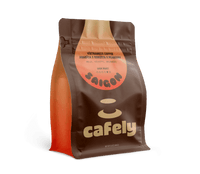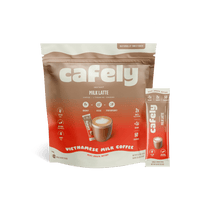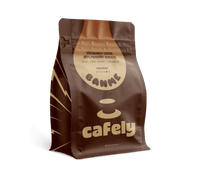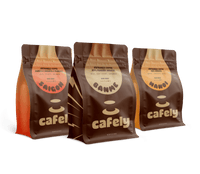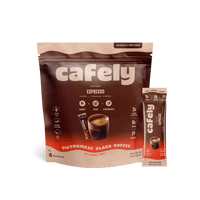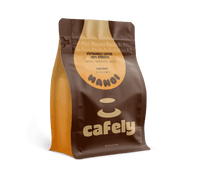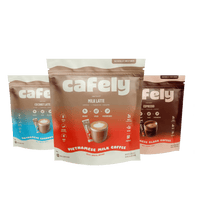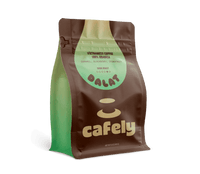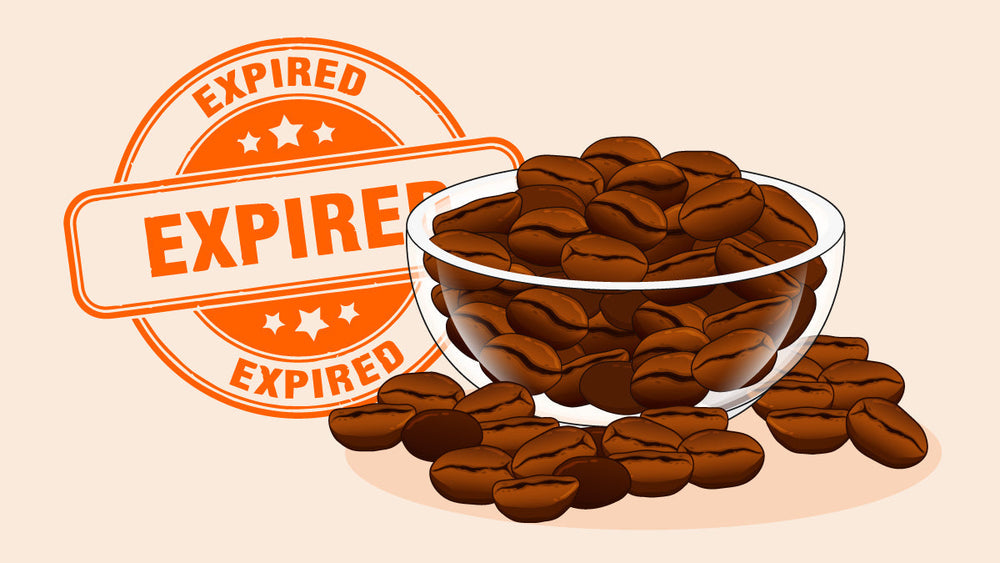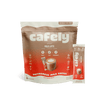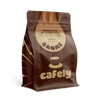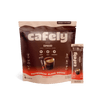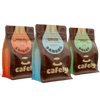You open the pantry, and there it is, a half-used bag of coffee you totally forgot about. You check the label. It expired… last year.
Can you drink expired coffee? Should you toss it? Will it make you sick?
Most expired coffee won’t hurt you, but there are a few important things to know before you brew it.
There’s a big difference between coffee that’s just past its prime and coffee that’s gone bad.
We'll tell you how to tell the difference, how long coffee really lasts, and when it’s time to let it go.
Can You Drink Expired Coffee: Is It Safe?
Yes, you can usually drink expired coffee if it’s been stored properly.
Coffee is naturally low in moisture. That’s good news, because it means bacteria and mold can’t easily grow in it. So even if it’s months past the date on the bag, that doesn’t automatically mean it’s unsafe — it just might not taste very good.
The expiration date printed on your coffee bag isn’t a warning about food safety. It’s more like a best flavor window. Roasters put those dates there to tell you when the coffee will taste its best, not when it magically turns bad.
Once coffee is roasted, it starts to lose its freshness. The oils in the beans begin to break down. The aroma fades. The flavor flattens. If you’ve ever brewed a cup that tasted dull, bitter, or just kind of “off,” there’s a good chance the coffee was stale.
So yes, it’s safe. But taste-wise? It depends.
Unopened vs. Opened Makes a Big Difference

If your coffee bag is still sealed, especially if it’s vacuum-packed or nitrogen-flushed, it could be decent long after the printed date.
Whole beans usually hold up better than ground coffee because they have less surface area exposed to air.
Sealed beans can stay drinkable for up to 6 to 12 months past their date, as long as they were stored in a cool, dry place.
Now, if the bag’s been opened, that’s another story. Once air gets in, oxidation speeds up. Ground coffee, in particular, can go stale fast, sometimes in just a few weeks. It’s still safe to drink, but the flavor quality drops quickly.
But Coffee Can Go Bad: Here’s When
While coffee doesn’t spoil like fresh food, there are cases where it becomes unsafe.
Moisture is the real enemy. If your coffee was exposed to humidity or stored somewhere damp, mold can grow — even if you can’t see it yet.
Here’s how to spot bad coffee:
- Damp or clumpy beans
- White spots, fuzz, or weird oil buildup
- The coffee smells sour, musty, or just “off”
In those cases, do not drink it. Mold spores and rancid oils can cause digestive issues or even trigger allergic reactions. It’s not worth the risk.
On the flip side, if it still smells like coffee— nutty, earthy, maybe even chocolatey — and looks dry and clean, you’re probably in the clear. It just might taste flat or bitter from age.
Coffee doesn’t really expire, but it can lose its flavor, and in some cases, become unsafe. Knowing the difference can save you from a bad cup… or worse.
Coffee Shelf Life by Type: Beans, Grounds, & Instant
So now you know expired coffee can be safe, but how long does it actually last?
That depends on the type of coffee you’re dealing with. Whole beans, ground coffee, and instant coffee all age differently. Each one has its own shelf life, and a lot of that comes down to how it's processed, packaged, and stored.
Let’s walk through what you can expect from each type and how to make it last longer.
Whole Beans: Best for Freshness
If you're buying coffee in whole bean form, you’re already one step ahead. Whole beans hold their flavor longer than any other type because less surface area is exposed to oxygen.
When stored properly, whole beans typically last:
- 3 to 4 weeks for peak flavor after opening
- Up to 6 to 12 months past the roast or “best by” date if sealed
That said, once you grind those beans, the clock starts ticking. The oils break down faster, and the flavor fades quickly. So if freshness matters, grind only what you need right before brewing.
Ground Coffee: Shorter Shelf Life
Pre-ground coffee is super convenient, but that convenience comes at a cost. Once coffee is ground, it’s much more vulnerable to air, light, moisture, and heat.
If you store it well, ground coffee lasts:
- 1 to 2 weeks after opening for the best flavor
- Up to 3 to 5 months past the printed date if unopened and sealed tightly
Even if it’s technically safe after that, the flavor won’t be the same. Expect a dull, flat, sometimes bitter brew.
Instant Coffee: The Longest Shelf Life
Instant coffee is the most shelf-stable option by far. It’s already been brewed, freeze-dried, and packaged to last.
Stored in a sealed container away from heat and moisture, instant coffee can last:
- Up to 2 years unopened
- Several months to a year after opening, if stored airtight
You’ll still want to check it before drinking, especially if the texture changes or you see clumps. Instant coffee can absorb moisture and spoil just like anything else if not sealed well.
What Affects Coffee Shelf Life?
A few key factors make a big difference in how long your coffee lasts:
- Processing: Freeze-dried or spray-dried instant coffee lasts longer than freshly roasted beans.
- Packaging: Vacuum-sealed or nitrogen-flushed bags protect against air and moisture.
- Storage: Keep coffee away from heat, sunlight, humidity, and oxygen. That means no clear containers on sunny countertops and no fridge unless it’s airtight and short-term.
- Roast Level: Dark roasts tend to go stale faster than light roasts. Why? The oils on dark beans are pulled to the surface during roasting, which speeds up oxidation. Light roasts stay stable longer because the oils stay locked inside.
Best By vs Expiration: Not the Same
Here’s where a lot of confusion starts.
That “best by” date on your coffee bag? That’s not an expiration date. It just tells you when the coffee will taste its best.
Coffee doesn’t magically go bad the day after. Many roasters don’t even print “expiration” dates because, technically, coffee doesn’t spoil the same way perishable items do.
The real expiration date depends more on how the coffee was stored and what signs it’s showing now.
Signs Your Coffee Has Actually Gone Bad

Just because the date passed doesn’t mean it’s bad, but there are times when coffee should absolutely be thrown out.
Here’s how to tell:
1. Visual Signs
Look at the beans or grounds closely. You’ll want to toss the coffee if you notice:
- White spots or fuzzy patches (possible mold)
- Wet clumps or sticky textures
- Odd discoloration like gray or greenish tones
If your instant coffee is clumping or has hardened into chunks, it means moisture got in, and that’s a big no.
2. Smell Test
Fresh coffee has a rich, inviting smell, nutty, earthy, chocolatey, and sometimes floral. If it smells stale, flat, sour, musty, or like cardboard, it’s past its prime. If it smells rancid or moldy, it’s not safe to use.
The stronger the smell of decay, the more likely it’s been exposed to moisture or air for too long.
3. Taste Check (If It Looks Safe)
Let’s say it passed the look and smell test. You can still give it a taste, but be honest with yourself.
If the flavor is:
- Bitter or hollow
- Sour or oddly citrusy
- Completely bland or watery
Then it’s stale. Not harmful, but probably not worth drinking either.
4. Moisture = Your Biggest Enemy
No matter what form of coffee you’re storing, moisture is the one thing that can make it unsafe. It creates the perfect environment for mold and bacteria, especially in dark roasts, which carry more oil.
If you ever suspect water exposure, don’t second-guess it. Just toss the coffee.
Best Storage Methods for Maximum Coffee Freshness
If you want your coffee to taste good past the first week, you’ll need to properly store your coffee.
Air, light, moisture, and heat — those are your four main enemies. Get storage right, and your beans or grounds can stay fresh for weeks or even months longer.
1. Use the Right Container
Ditch the bag your coffee came in, especially if it’s the kind with a loose fold or a plastic zip. Once you open the bag, oxygen sneaks in fast. That’s when the oils start breaking down and the flavor fades.
Your best move is to transfer your coffee to an airtight, opaque container. You want something that locks out air completely and keeps light out too. Glass jars may look nice, but they don’t block UV rays.
Go for a solid metal or ceramic canister, or a dark plastic one if that’s what you have. If you’re serious, you can also find containers with vacuum-sealing lids to push air out after every use.
2. Store It Somewhere Cool & Dry
After you seal it up, don’t just leave it on the counter. Even indirect sunlight, warm air, or humidity from a nearby stove can mess with the flavor over time. Heat speeds up oxidation, and moisture is a fast track to mold.
The best spot is a cool, dark cabinet, ideally away from your oven, sink, or any heat source. Upper shelves tend to stay drier and more stable in temperature than low ones near appliances. If you live somewhere humid, a closed pantry or cupboard with good airflow works best.
3. Should You Refrigerate or Freeze Coffee?
This one causes a lot of confusion, so let’s clear it up.
Refrigerating coffee? Not a good idea. The fridge is full of moisture and odors, both of which coffee absorbs easily.
If you’ve ever tasted beans that somehow reminded you of garlic or leftovers, that’s why. Cold air also causes condensation when you take the coffee in and out, which introduces moisture over time.
Freezing, though, can work, if you do it right. If you buy coffee in bulk and want to store it for later, freezing is an option. But don’t open and close the bag every day. Instead, split the coffee into smaller airtight bags or containers and only thaw one at a time. Always let it come to room temperature before opening. That way, no moisture gets trapped inside as it warms up.
So if you’re going through your coffee regularly, skip the freezer and stick to shelf storage. If you’re stocking up for the long haul, freeze it once, in small batches, and don’t refreeze after opening.
4. Living With Limited Space?
If you live in a small apartment or don’t have cabinet space, just avoid heat and moisture as much as possible.
Even if all you’ve got is a corner of the kitchen counter, make sure the container is sealed tight and shielded from light. A tin canister in a drawer works better than a glass jar by the window.
For those in very humid climates, you can toss a food-safe desiccant pack into your coffee container. It helps control moisture and slows down flavor loss.
5. Can You Bring Stale Coffee Back to Life?
If your coffee’s already gone a bit stale, but still smells okay, you might be able to stretch it a little further.
You can use it for traditional cold brew, which takes longer to extract flavor, so even older beans can produce a smooth, drinkable cup. You won’t get that bright, fresh flavor, but you also won’t taste the bitterness that hot brewing pulls from stale grounds.
Another option is to mix half a batch of old coffee with half of a newer batch. You’ll mask some of the flatness without wasting the beans entirely.
Just don’t expect miracles. If your coffee’s lost its aroma and has no flavor left, it’s time to let it go.
FAQs About Expired Coffee

Here are straight answers to the most common questions people have about expired coffee — what's safe, what’s not, and how to handle it.
1. Can Old Coffee Cause Stomach Upset?
Yes, very old coffee can cause mild digestive discomfort, especially if the oils in the beans have gone rancid. This isn’t the same as food poisoning — it’s more like irritation from degraded compounds. It usually only happens with coffee that’s been improperly stored or kept for years.
2. Can I Use 2-Year Expired Coffee?
You can, but the quality will be poor. If the coffee was sealed and stored in a cool, dry place, it’s likely still safe. That said, after two years, most of the flavor compounds and aroma will have broken down. The caffeine may still be there, but the taste will be flat, bitter, or stale.
3. What Are the Side Effects of Drinking Expired Coffee?
The most common side effect is mild stomach irritation from oxidized or rancid oils in very old coffee. This is different from getting sick from spoiled food. It won’t usually harm you, but it can be unpleasant. Caffeine content like in iced coffee, stays relatively stable, but the flavor and aroma fade over time.
4. How Long Does Brewed Coffee Last Before Spoiling?
Brewed black coffee is safe at room temperature for up to 12 to 24 hours, though flavor declines after 30 minutes. If refrigerated, it can last 3 to 4 days. Coffee with milk or creamer should be discarded after 2 hours unrefrigerated or kept no more than 1 to 2 days in the fridge.
5. Is It Safe to Drink Coffee With White Spots On the Beans?
It depends. White spots may be harmless crystallized oils, especially on dark roasts. But if the texture looks fuzzy or the beans smell musty, it could be mold. Moldy beans should always be discarded. If you're unsure, check for any off smells or visible clumping.
6. Does Sealed Coffee Go Bad?
Sealed coffee doesn’t spoil quickly, but it does degrade over time. Vacuum-sealed or nitrogen-flushed bags protect freshness better than simple valve bags. If stored in a cool, dark place, sealed coffee can stay safe for 6 to 12 months past its best-by date, though flavor and aroma will slowly decline.
7. Can Brewed Coffee Go Bad?
Yes. Brewed coffee can grow mold or develop off-flavors if left too long. It’s safe at room temperature for up to 12 to 24 hours without milk. Refrigerated brewed coffee lasts 3 to 4 days. Discard if it smells sour, develops a film on the surface, or tastes bitter and flat.
8. Does Expired Coffee Lose Potency?
Yes, but slowly. Caffeine remains mostly stable, but the compounds responsible for flavor and aroma break down over time. As coffee stales, it may taste weaker or dull even if the caffeine level hasn’t dropped much. The perceived strength drops before the actual caffeine content does.
9. How to Use Expired Coffee?
If it smells fine but tastes stale, use it outside the cup. Old grounds can be added to compost, used as fertilizer in gardens, or turned into natural odor absorbers. They also work well in DIY body scrubs or cleaning pastes. Just don’t use anything that shows mold or smells off.
10. Does Dark Roast Coffee Expire Faster Than Light Roast?
Yes. Dark roast beans contain more surface oils, which oxidize and go rancid faster than the lighter, drier beans in a light roast. When stored the same way, dark roasts typically lose freshness sooner, especially if exposed to air or heat.
